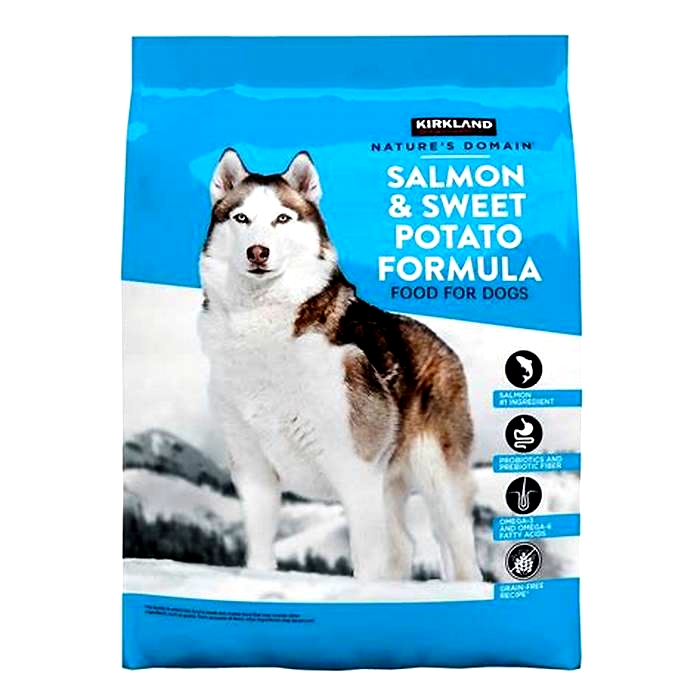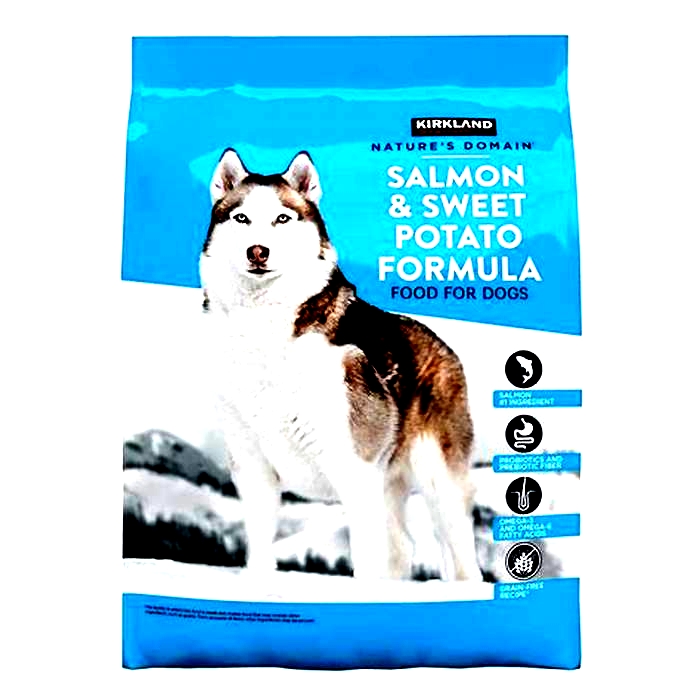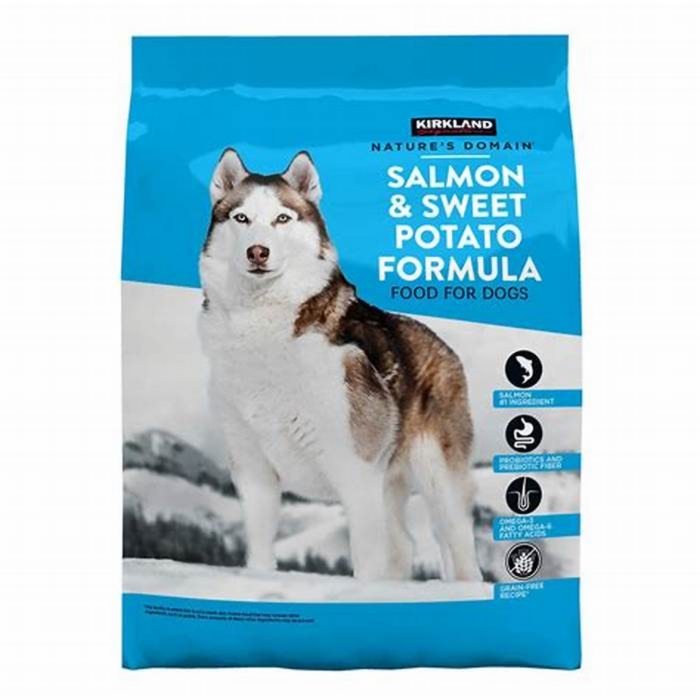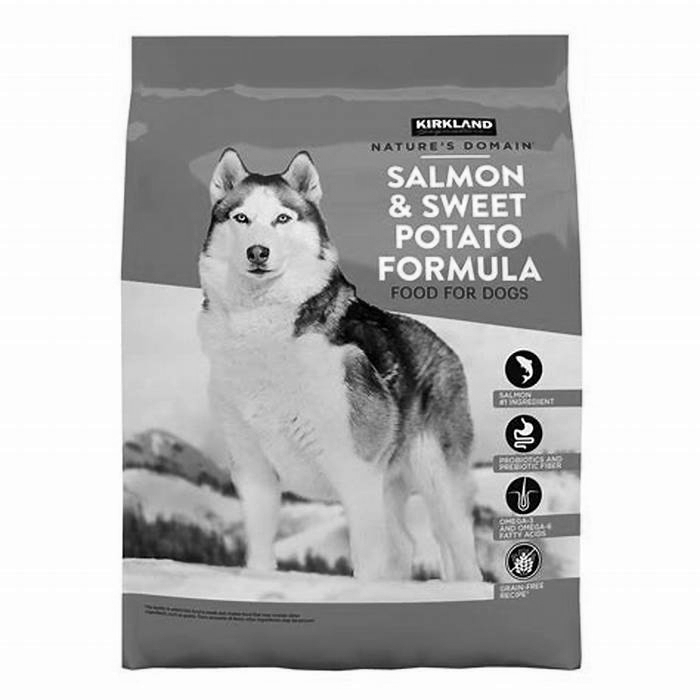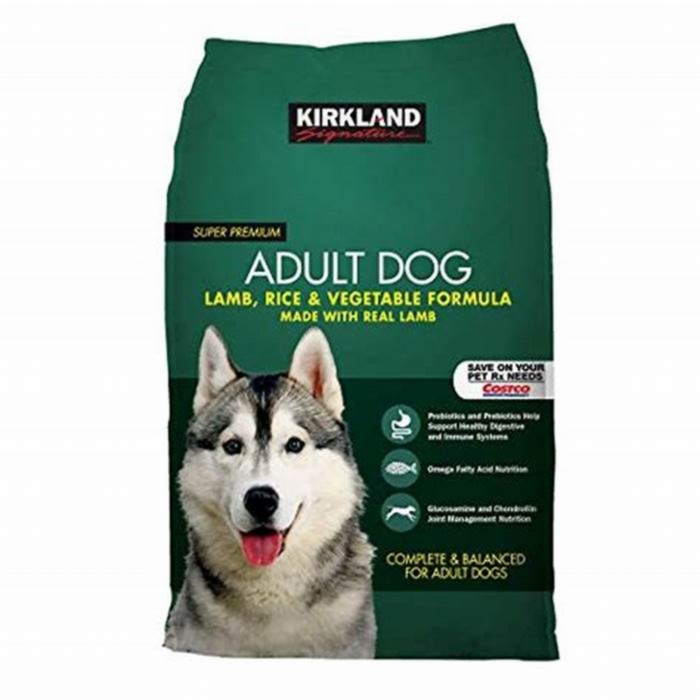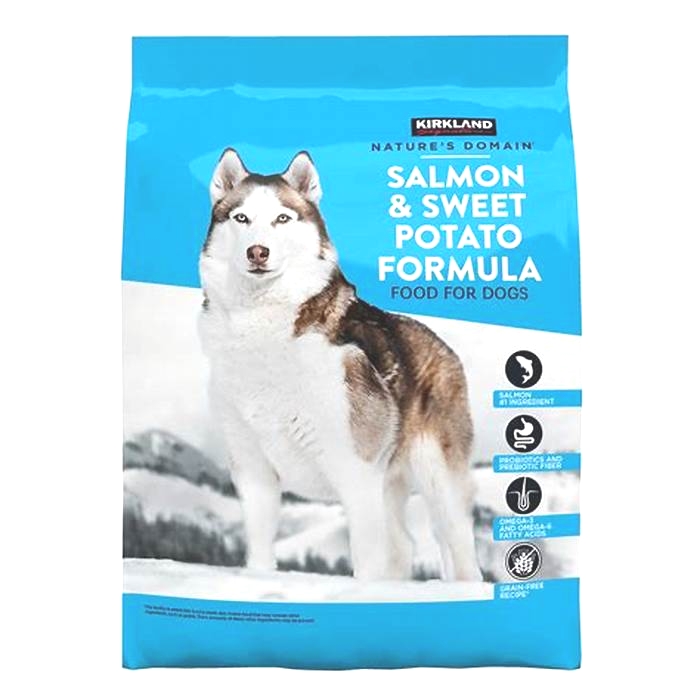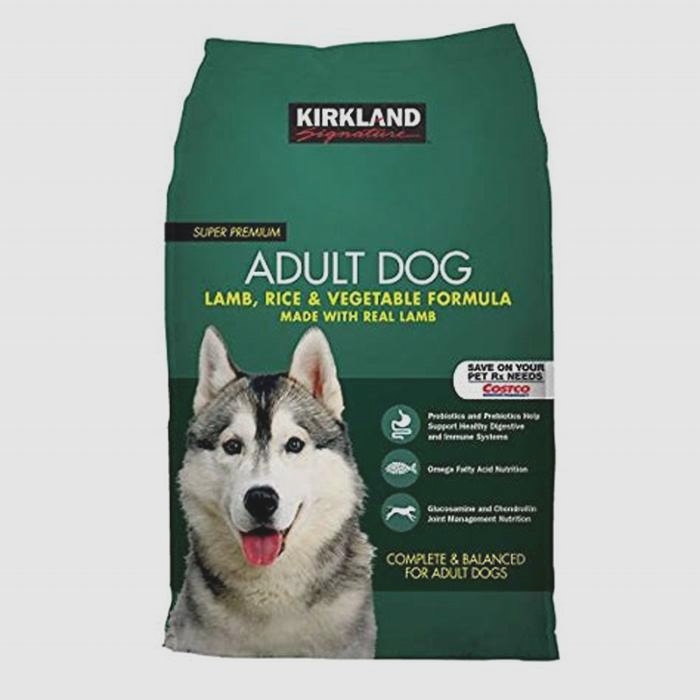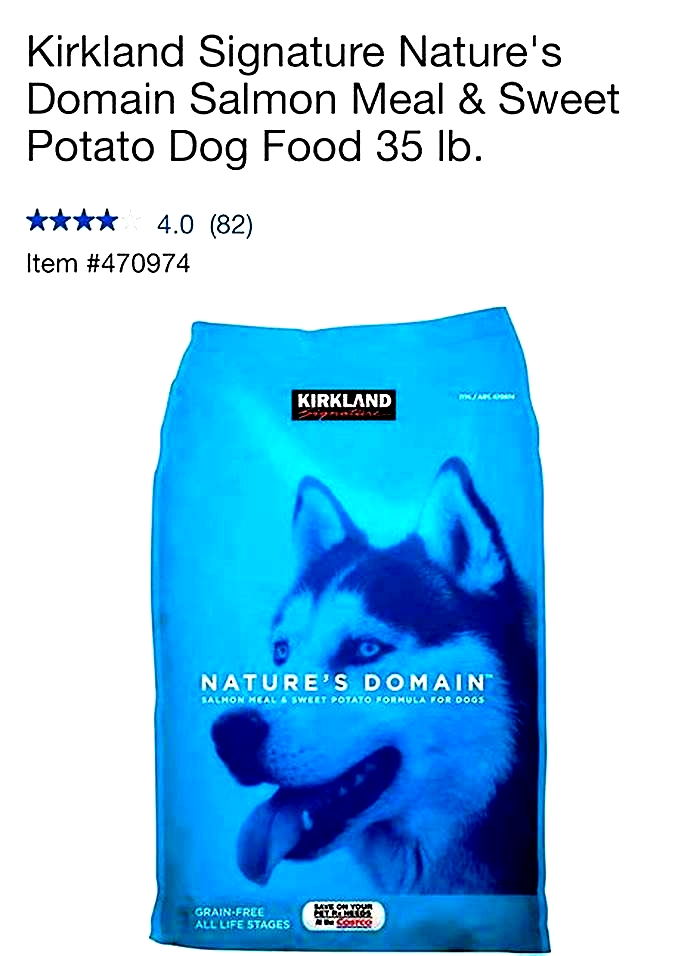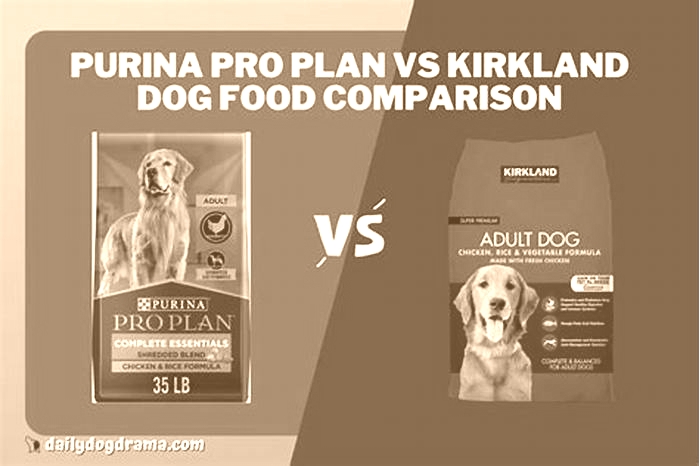kirkland salmon dog food ingredients
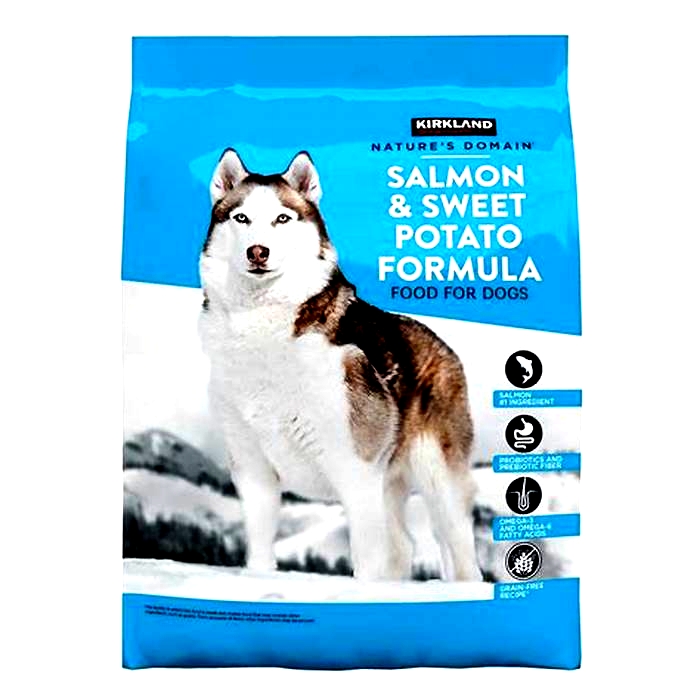
Kirkland Natures Domain Dog Food Review (Dry)
The Kirkland Signature Natures Domain product line includes the 6 dry dog foods listed below.
Each recipe includes its AAFCO nutrient profile: Growth (puppy), Maintenance (adult), All Life Stages, Supplemental or Unspecified.
Recipe and Label Analysis
Natures Domain Turkey and Sweet Potato was selected to represent the other products in the line for detailed recipe and nutrient analysis.
Ingredients Analysis
The first ingredient in this dog food is turkey meal. Turkey meal is considered a meat concentrate and contains nearly 300% more protein than fresh turkey.
The second ingredient is sweet potato. Sweet potatoes are a gluten-free source of complex carbohydrates in dog food. They are naturally rich in dietary fiber and beta carotene.
The third ingredient includes peas. Peas are a quality source of carbohydrates. And like all legumes, theyre rich in natural fiber.
However, peas contain about 25% protein, a factor that must be considered when judging the meat content of this dog food.
The fourth ingredient is potato. Potatoes can be considered a gluten-free source of digestible carbohydrates. Yet with the exception of perhaps their caloric content, potatoes are of only modest nutritional value to a dog.
The fifth ingredient is canola oil. Unfortunately, canola can be a controversial item. Thats because it can sometimes (but not always) be derived from genetically modified rapeseed.
Yet others cite the fact that canola oil can be a significant source of essential omega-3 fatty acids.
In any case, plant-based oils like canola are less biologically available to a dog than fish oil as a source of quality omega-3 fats.
The sixth ingredient is tomato pomace. Tomato pomace is a controversial ingredient, a by-product remaining after processing tomatoes into juice, soup and ketchup.
Many praise tomato pomace for its high fiber and nutrient content, while others scorn it as an inexpensive pet food filler.
Just the same, theres probably not enough tomato pomace here to make much of a difference.
The seventh ingredient is flaxseed, one of the best plant sources of healthy omega-3 fatty acids. Provided theyve first been ground into a meal, flax seeds are also rich in soluble fiber.
However, flaxseed contains about 19% protein, a factor that must be considered when judging the actual meat content of this dog food.
After the natural flavor, we find salmon oil, which is naturally rich in the prized EPA and DHA type of omega-3 fatty acids. These two high quality fats boast the highest bio-availability to dogs and humans.
Depending on its level of freshness and purity, salmon oil should be considered a commendable addition.
From here, the list goes on to include a number of other items.
But to be realistic, ingredients located this far down the list (other than nutritional supplements) are not likely to affect the overall rating of this Kirkland product.
With 3 notable exceptions
First, chicory root is rich in inulin, a starch-like compound made up of repeating units of carbohydrates and found in certain roots and tubers.
Not only is inulin a natural source of soluble dietary fiber, its also a prebiotic used to promote the growth of healthy bacteria in a dogs digestive tract.
Next, this recipe contains sodium selenite, a controversial form of the mineral selenium. Sodium selenite appears to be nutritionally inferior to the more natural source of selenium found in selenium yeast.
And lastly, this food includes chelated minerals, minerals that have been chemically attached to protein. This makes them easier to absorb. Chelated minerals are usually found in better dog foods.
Nutrient Analysis
Based on its ingredients alone, Kirkland Signature Natures Domain Dog Food looks like an above-average dry product.
The dashboard displays a dry matter protein reading of 27%, a fat level of 16% and estimated carbohydrates of about 50%.
As a group, the brand features an average protein content of 29% and a mean fat level of 16%. Together, these figures suggest a carbohydrate content of 47% for the overall product line.
And a fat-to-protein ratio of about 57%.
Near-average protein. Near-average fat. And near-average carbs when compared to a typical dry dog food.
Even when you consider the protein-boosting effect of the peas and flaxseed in this recipe, and the legumes contained in other recipes, this still looks like the profile of a dry dog food containing a notable amount of meat.
Kirkland Dog Food Recall History
The following automated list (if present) includes all dog food recalls related to Kirkland through April 2024.
You can view a complete list of all dog food recalls since 2009 here.
Our Rating of Kirkland Grain Free and Grain Inclusive Dog Food
Kirkland Signature Natures Domain is a grain-free and grain-inclusive dry dog food using a notable amount of named meat meals as its dominant source of animal protein, thus earning the brand 4.5 stars.
Kirkland Signature Dog Food Ingredients

Kirkland Signature Dog Food Ingredients
According to our research, Kirkland Signature manufactures 13 dog food recipes using 118 unique ingredients. To evaluate the quality of ingredients used by Kirkland Signature, we've studied all 118 ingredients. In this article, we'll share our findings on Kirkland Signature ingredients.
| Dog Food Recipes | 13 |
| Unique Ingredients | 118 |
| Artificial Colors | 0 |
| Animal By-Products | 0 |
| Anonymous Meats | 1 |
| Controversial | 8 |
| Harmful | 0 |
First 5 Ingredients
Dog food ingredients in the United States are listed in descending order of pre-cooked weight. The first 5 ingredients typically constitute a significant portion of the recipe.
For Kirkland Signature, these are the most common ingredients found within the first 5 dog food ingredients.
- chicken
- chicken meal
- whole grain brown rice
- cracked pearled barley
- canola oil
As you can see, the most common first ingredient in Kirkland Signature is chicken. The most common 2nd ingredient is chicken meal, followed by whole grain brown rice, cracked pearled barley, and canola oil.
Artificial Food Coloring Dyes
Kirkland Signature does not use any artificial food coloring dyes. According to our records, none of the 13 Kirkland Signature dog foods contain artificial food dyes.
Artificial food coloring dyes are unnecessary and potentially harmful ingredients. In general, we not not recommend feeding any pet foods that contain artificial dyes.
In 2010, the CSPI raised serious concerns regarding the safety of many artificial dyes. Most of the studies referenced by the CSPI involved prolonged or excessive consumption. Since most dogs consume the same foods throughout their lives, concerns raised by the CSPI are alarming to say the least.
To read more about Artificial Food Dyes, click here.
Animal By-Products
According to our records, Kirkland Signature does not contain any animal by-products.
Animal by-products are basically the leftover parts of the the carcass after its been processed for meat. AAFCO defines by-products as the non-rendered, clean parts, other than meat, derived from slaughtered mammals.
Although by-products are still fairly nutritious ingredients, consumers have equated them with slaughterhouse waste. Therefore, most premium brands, including Kirkland Signature have decided to remove by-products and instead use named organ meats (beef liver, chicken gizzards).
For further reading on the controversy over animal by-products, click here.
Anonymous Meat Ingredients
Anonymous meats are animal-based ingredients which do not provide the source animal's name. These ingredients are controversial because they can come from almost any animal.
In addition, anonymous animal-based ingredients are very inexpensive and often the lowest quality meats that are still allowed to be used in pet food.
In general, we do not recommend feeding any products which contain anonymous meats. When in doubt, always contact the brand's customer service desk for further clarification.
Unfortunately, we've identified 1 anonymous meat ingredient used by Kirkland Signature.
Fish meal is defined by AAFCO as "the clean, dried, ground tissue of undecomposed whole fish or fish cutting, either or both, with or without the extraction of part of the oil." Since the specific type of fish is not mentioned, we cannot discuss any specific qualities of this ingredient. In general, anonymous ingredients are low quality inclusions when compared to ingredients such as tuna meal, salmon meal, catfish meal, etc.
The following recipes contain fish meal:
Controversial Ingredients
In most cases, ingredients which are given the controversial classification can be substituted with higher-quality alternatives. You should evaluate each controversial ingredient independently to see if there is truly a valid cause for concern.
Keep in mind, certain sacrifices often must be made to produce dog foods at a reasonable price. In general, the more expensive the product, the fewer controversial ingredients you'll find.
In our analysis, we've identified 8 controversial ingredients inside Kirkland Signature products. These controversial ingredients are listed below. Click on each ingredient for more information.
Powdered cellulose is produced from minuscule pieces of wood pulp and plant fibers. Other than its fiber content, powdered cellulose lacks any nutritional contribution.
The following recipes contain powdered cellulose:
Pea protein is produced by removing the starchy parts of peas. Pea protein is considered controversial because it provides a substantial plant based protein boost. This boost is undesirable because plant based protein is typically lower in biological value when compared to meat based proteins.
The following recipes contain pea protein:
Canola oil is a plant-derived oil from the seeds of canola plants. Although fat is an essential component of any diet, canola oil is controversial in pet food. Proponents claim that canola oil provides a better fat profile in comparison to other plant based oils. However, opponents claim that canola oil is typically produced with genetically modified rapeseed and that rapeseed oil has multiple adverse health affects.
The following recipes contain canola oil (preserved with mixed tocopherols):
Organic pea protein is produced by removing the starchy parts of peas. Pea protein is considered controversial because it provides a substantial plant based protein boost. This boost is undesirable because plant based protein is typically lower in biological value when compared to meat based proteins.
The following recipes contain organic pea protein:
Canola oil is a plant-derived oil from the seeds of canola plants. Although fat is an essential component of any diet, canola oil is controversial in pet food. Proponents claim that canola oil provides a better fat profile in comparison to other plant based oils. However, opponents claim that canola oil is typically produced with genetically modified rapeseed and that rapeseed oil has multiple adverse health affects.
The following recipes contain canola oil:
Tomato pomace is a by-product of tomato manufacturing. It's considered a controversial ingredient because many people believe it is an inexpensive low quality filler. However, tomato pomace provides a notable amount of dietary fiber, B vitamins, Lycopene, and vitamin A. Although it is a very inexpensive ingredient, it is not nutritionally empty.
The following recipes contain tomato pomace:
Organic canola oil is a plant-derived oil from the seeds of canola plants. Although fat is an essential component of any diet, canola oil is controversial in pet food. Proponents claim that canola oil provides a better fat profile in comparison to other plant based oils. However, opponents claim that canola oil is typically produced with genetically modified rapeseed and that rapeseed oil has multiple adverse health affects.
The following recipes contain organic canola oil (preserved with mixed tocopherols):
Organic canola meal is a high protein by-product of canola oil production. This ingredient is marked controversial because it may be derived from genetically modified rapeseed, which is associated with multiple adverse health affects.
The following recipes contain organic canola meal:
Potentially Harmful Ingredients
Harmful ingredients are those which have been linked to adverse health effects. In general, we do not recommend feeding any product which contains any harmful ingredients.
During our review, none of the Kirkland Signature ingredients analyzed were classified as harmful by our system. The absence of harmful ingredients is indicative of a relatively premium dog food brand.

